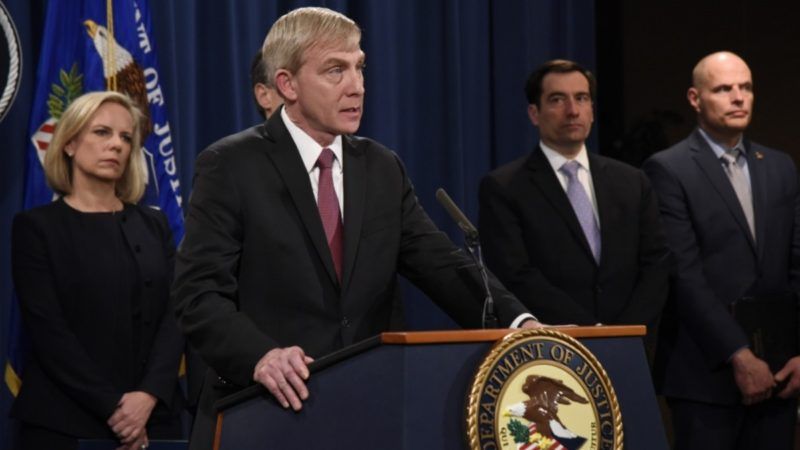DOJ Intervention Dramatically, Irrationally, and Unconstitutionally Increases the Penalty Faced by a Woman Accused of Slapping Jews
How can prosecuting a black woman for slapping Jews in 2020 be authorized by the constitutional amendment that abolished slavery in 1865?

Over the course of eight minutes early in the morning on December 27, according to a federal affidavit unsealed yesterday, a 30-year-old woman named Tiffany Harris slapped three Jewish women—two across the face and one on the back of the head—as they were walking in the Crown Heights section of Brooklyn. "Fuck you, Jews," she reportedly said during the second incident.
What Harris allegedly did is obviously a crime, but why is it a federal crime? There is no satisfying practical, moral, or constitutional answer to that question. Making a federal case out of those three slaps nevertheless dramatically increases the maximum sentence Harris faces if she is convicted.
Harris, who was arrested by New York City police officers shortly after the attacks, was initially charged with assault, attempted assault, harassment, and menacing under state law. The most serious of those charges, assault in the third degree, is a Class A misdemeanor, which is punishable by up to a year in jail. If it were charged as a hate crime (based on the allegation that Harris slapped the women "in substantial part because" she perceived them as Jews), it would become a Class E felony, punishable by up to four years in prison.
On top of those state charges, Harris now faces three federal counts under 18 USC 249, which applies to an offender who "willfully causes bodily injury" to someone "because of" that person's "actual or perceived race, color, religion, or national origin." That crime is a felony punishable by up to 10 years in prison.
If Harris is convicted under both state and federal law, she theoretically could face combined prison sentences as long as 14 years, more than three times the maximum penalty under state law—and 14 times the maximum penalty Harris would face if the assaults were prosecuted in state court without New York's hate crime enhancement. That seems like a disproportionate response to three slaps, whatever the motivation for them.
Since New York already was prosecuting Harris, what purpose is served by a federal prosecution? "The use of violence, or the threats of violence, against anyone based on the victim's religion will not be tolerated, and those who engage in such conduct will learn that under federal law there are serious consequences for hate crimes," says Richard Donoghue, the U.S. attorney for the Eastern District of New York. But it's not as if New York was tolerating such violence. State law not only punishes assault but also punishes it more severely when it is motivated by anti-Semitism.
"Any offensive physical assault is a crime of violence, and it should be obvious that perpetrators need to be held accountable," says William Sweeney, the assistant director in charge at the FBI's New York office. "When one's actions are motivated by their hatred of another group and supported by anti-Semitic sentiments, however, it opens up the possibility of federal criminal charges, which are hard to walk away from. Tiffany Harris now faces up to 10 years in prison for her alleged actions. The lesson to others thinking of behaving as we allege Ms. Harris did—knock it off now or we are going to lock you up. The anti-Semitic attacks in this city and elsewhere have been outrageous, and the FBI will use the full extent of the laws at our disposal to protect the community."
Even if you accept the questionable premise that crimes should be punished more severely when they are motivated by bigotry, New York has a hate crime law that already quadrupled the potential punishment for these assaults. It is not obvious why a tenfold increase is more appropriate, let alone why people should be punished twice for the same crime, once under state law and again under federal law. Whether or not you buy the Supreme Court's counterintuitive conclusion that such serial prosecutions do not constitute double jeopardy under the Fifth Amendment, they certainly do not look like justice.
Sweeney's reference to "the anti-Semitic attacks in this city and elsewhere" implies that Harris is being punished not just for her own actions but for the crimes of others as well. If New York City had not recently seen a much-publicized increase in reports of anti-Semitic crimes, the Justice Department probably would not have gotten involved in such a minor case. But how can it be fair to impose extra punishment on a defendant merely because the sort of crime she committed happens to be on the rise? Punishment should be based on the nature of the defendant's crime, regardless of what other people are doing.
Federal hate crime laws invite this sort of capricious, politically motivated intervention, which is especially troubling given their weak constitutional basis. The constitutional rationale for 18 USC 249, for example, is that it serves to eliminate "the badges, incidents, and relics of slavery," a congressional power inferred from the 13th Amendment. If you don't see how prosecuting a black woman for slapping Jews in 2020 is authorized by the amendment that abolished slavery in 1865, you are paying more attention than the Justice Department thinks you should.
